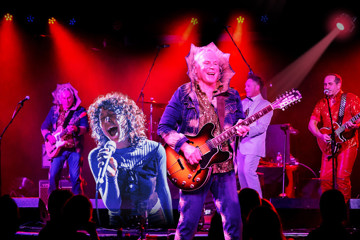The Unknown
"We kind of like to share scary stories, it evokes people’s own stories and people share stories with each other."
Imagine that moment, seated around the campfire, a torch held beneath the chin of the storyteller eerily lighting their face from below. Fellow campers shift to the edge of their seats, they hold their breath, they wait. At some point the story ends – maybe it's funny, perhaps still scary, maybe the ending is as ill-defined as the threat – though this doesn't concern Tamara Saulwick. She's interested in those moments of not knowing, of preparing, of suspense – that's what lies at the centre of her audio-sensory work, Pin Drop, part documentary, part urban thriller, that combines Saulwick's solo performance with a score composed by Peter Knight that utilises a range of interviews conducted by Saulwick (hence the 'documentary' tag).
“They were really open-ended discussions,” Saulwick recalls of those interviews, the scope of which spanned people aged six to 92, “so they were all really long interviews. But essentially, I was interested to know if anyone had ever had an experience where they felt that they were under threat in any way from someone that they didn't know. I didn't want at all to go into domestic violence territory, I felt that was really outside of the area I was looking at – so I wasn't asking people if they'd ever felt threatened by someone they knew. The focus of this work really is on how we negotiate that space of fear in ourselves, so I was as interested in stories that might potentially not be actually dangerous, but when you don't really know.
“Some of the stories you're actually going 'Oh my God!' and some of the stories just occupy more of that…” Saulwick here offers up an ominous and sickly urgh as description. “You know, in that suspense space. The work focuses on how we are in that space when we're not quite sure that we know what the situation is. I really wasn't interested in depicting acts of violence on stage – that's not what the show is – and it's really not in that territory, it's really about the space before,” says Saulwick, filling the final word with an chilling weight as she says it.
Back to the image of the campfire, that practice of sharing experience, and in doing so, cultivating and honing stories. With the interviews conducted by Saulwick forming such an integral part of the work, the storytelling skills of her subjects consistently impressed her. “Because all the events people are relating are things that have happened to them in the past, they've gone through that process of becoming a story; something's happened a few years ago and you've told people about it a few times, it starts to become a story. People start to know how to tell it really well. And so some of these stories are just told really well by the interviewee.
Don't miss a beat with our FREE daily newsletter
“We kind of like to share scary stories, it evokes people's own stories and people share stories with each other and there starts to be a dialogue around it and an acknowledgement that these are some of the things that we are negotiating all the time. I wasn't interested in doing something that was just about what happens to other people where we sit in the audience and go, 'Gee those poor people.' I was interested in the audience being implicated.”
Pin Drop runs from Wednesday 1 to Saturday 4 August, Performance Space, Carriageworks.







